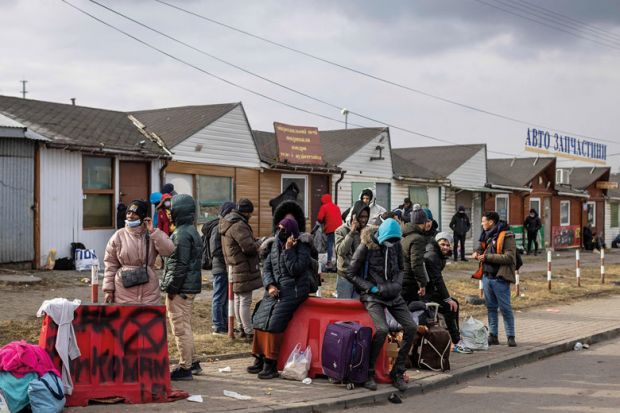Some international students are still stuck in Ukraine more than two years on since Russia’s invasion, trapped in a legal limbo that means they can neither officially stay in nor leave the country.
One Zimbabwean who was pursuing a computer science degree in February 2022 told Times Higher Education that the cancellation of his student visa had left him marooned in Ukraine and largely confined to his home for fear of detention.
Authorities told the student, who asked to remain anonymous, that his visa was revoked after he fled Kyiv following the outbreak of war without informing them of his change of address. But doing so was impossible, he said, because of the closure of universities and government offices; hotlines were only available in Ukrainian, of which he spoke little. Subsequent attempts to leave Ukraine, meanwhile, saw him turned away at the border after being unable to prove his stay in the country was legal.
“It’s really hard to get any assistance. No one listens to you in immigration; no one listens to you at the border; no one listens to you in the police,” he said. “You can’t leave. You can’t stay.”
The student said he fled Kyiv with friends in March 2022, initially attempting to cross into Poland after Ukraine closed its airspace. He gave up after three days during which he experienced racism at the border, where African and Indian students were held aside while Ukrainian citizens were permitted to cross.
From Lviv, the student moved further west to Uzhhorod and enrolled at a different university. However, he learned that his permission to stay had been revoked when his new university applied to renew his student visa. After appealing to the authorities, his institution told him that it was “powerless” to help further, and he was expelled.
A court appeal, which was conducted in Ukrainian without a translator, was rejected. Ordered to leave Ukraine within 30 days, the student attempted to exit via Hungary, then Moldova, informed at the border every time that third-country nationals were no longer permitted to leave without documentation. At embassies for each, he was told that he could not obtain a transit visa without proof his stay in Ukraine was legal.
The student said that the Ukrainian authorities seemed unwilling to engage with the nearest Zimbabwean embassy, in Berlin, and he has now exhausted multiple appeals. He is awaiting a date at the Supreme Court.
A number of other Indian and African students are believed to be in a similar situation.
The student told THE that he was afraid to leave home and risk being stopped by police. “You rarely go out, especially as an African or brown person, and police don’t stop you,” he said.
Without a visa, he said, “You cannot use your bank account, you cannot go to hospital, you cannot rent an apartment – you cannot do anything.” His parents send money to his girlfriend for living expenses.
When he does go outside, he is met with racist assumptions about his loyalties, he told THE. “Yes, there was racism before the war,” he said. “But now when people encounter you, even individuals on the street or the bus, they’ll say ‘Which side are you on? Say slava Ukraini.’”
His biggest fear, he said, was that he will waste years in limbo: unable to stay, unable to leave. “If I was studying, I wouldn’t worry,” he said. “I’m more afraid that I might be able to do nothing with my life.”




